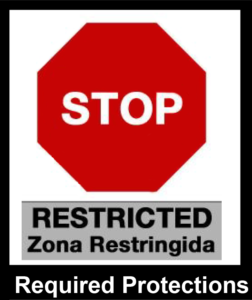University laboratories contain equipment, technology, material, data, and proprietary information that must be secured from theft or unauthorized access. It is the responsibility of Principal Investigators to:
- Identify security risks in the laboratory
- Develop and implement lab security procedures to prevent unauthorized entry into the laboratory
- Provide laboratory security awareness training to personnel
|Collapse All
Security Risks for Laboratories
Security risks for laboratories include:
- Theft of hazardous substances from the laboratory or during transit (at points between supplier and the laboratory or at the loading dock);
- Theft of mission critical or high value equipment;
- Threats from activist groups;
- Intentional release or exposure to hazardous substances;
- Sabotage or vandalism of high value equipment;
- Loss or release of sensitive information; and
- Rogue work or misuse of the laboratory
Security Procedures for Laboratories
The following security procedures must be followed in all laboratories:
- Keep laboratory doors closed at all times
- Lock laboratory doors when the laboratory is unoccupied
- Keep laboratory windows closed and locked at all times
- Do not leave hazardous material unattended and unsecured
- Restrict access to freezers, refrigerators, storage cabinets, and other equipment where hazardous materials are stored
- Limit laboratory access to approved personnel who are properly trained
- Promptly remove laboratory access when an individual ceases to work in the laboratory
- Restrict off-hours access to only those individuals who must access the lab for essential job duties
- Escort visitors to and from the laboratory
- Question and report any unfamiliar or suspicious individuals that gain access to restricted areas or the laboratory
- Report any missing inventory to University Police
- Report all acts of vandalism, theft, or suspicious activities to University Police
Laboratory Access
Access to laboratories is granted to trained personnel who have responsibilities that require them to access the laboratory. This includes support services staff (University Police, Facilities and housekeeping staff, and safety professionals), the Principal Investigator or Laboratory Supervisor, and those individuals authorized by the Principal Investigator or Laboratory Supervisor. An individual must have authorization from the designated authorizing agent in order to obtain a hard key or electronic access to a laboratory.
Principal Investigators should review the list of individuals with access to their laboratory on a regular basis and promptly remove access for individuals no longer associated with the laboratory (with the exception of support services staff mentioned above).
Additional information about issuance and termination of access can be obtained through the Key Control Office of the Department of Police and Public Safety.
Restricted Laboratories
Certain laboratories are designated restricted areas due to the types of hazards present in those laboratories. Laboratories designated as restricted areas are labelled with a restricted access symbol. Support services staff are not permitted to enter restricted areas without proper training and prior approval from the Principal Investigator, Laboratory Supervisor, or the Environmental Health and Safety Office.
The following areas are restricted:
- Laboratories where research animals are housed;
- Hazardous waste storage closets
- Laboratories where certain infectious agents are used and all laboratories operating at Biosafety Level 3;
- Laboratories or waste rooms where Ionizing radiation is present;
- Laboratories containing open source Class 3b or 4 lasers;
- Laboratories containing magnetic resonance imaging or nuclear magnetic resonance equipment.


